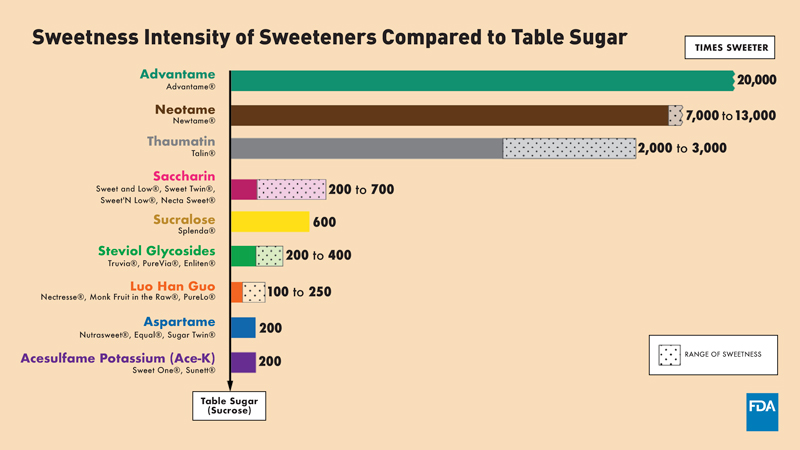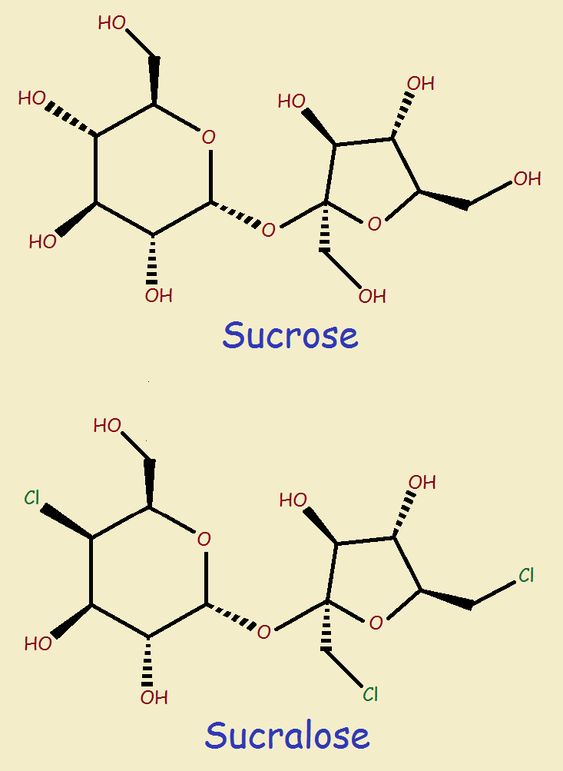Key Points:
- The FDA says artificial sweeteners are safe while the WHO recommends against them.
- The artificial sweetener sucralose has been shown to promote inflammation and insulin resistance in humans.
- Artificially sweetened beverages are associated with a higher risk of obesity, type 2 diabetes, hypertension, cardiovascular disease, and all-cause mortality.
The Food and Drug Administration (FDA) has approved six artificial sweeteners, including aspartame in 1996 and sucralose in 1999. Sweeteners are 100 to 20,000 times sweeter than table sugar (sucrose) and touted as low- to no-calorie alternatives to les bonnes choses. However, despite staying “abreast of published literature,” the FDA’s approval of artificial sweeteners contradicts the recommendations of other authoritative entities.

In 2023, the World Health Organization (WHO) recommended that “non-sugar sweeteners not be used as a means of achieving weight control or reducing the risk of noncommunicable diseases.” Noncommunicable diseases (NCDs) include cardiovascular disease, type 2 diabetes, and certain types of cancer. The NUGAG, a WHO subgroup that focuses on obesity and diet-related NCDs, said,
“The lack of evidence to suggest that non-sugar sweetener use is beneficial for body weight or other measures of body fatness over the long term, together with possible long-term undesirable effects in the form of increased risk of NCDs and death, outweighed any potential short-term health effects resulting from the small reductions in body weight and BMI.”
This means that artificial sweeteners could increase the risk of NCDs and death. Considering that one of the major risk factors for NCDs and death is aging, could artificial sweeteners contribute to aging? At least in the case of sucralose, some randomized controlled trials suggest that this may be the case.
Sucralose
Today, sucralose — sucrose with chlorine atoms added to it — is the most common artificial sweetener on the market. It can be found in chewing gum, diet sodas, as well as many sugar-free and low-sugar products. Studies have shown that the amount of sucralose found in a diet soda drink could promote inflammation, a hallmark of aging.
For example, overweight women who drank three diet sodas per day containing sucralose (200 mg/day) and an artificial sweetener called acesulfame-potassium for 8 weeks displayed an increase in inflammatory gene activation. However, changes in circulating inflammatory markers were not observed. Additionally, young adults displayed elevated markers of inflammation 15 minutes after consuming 48 mg of sucralose.

Sucralose may also have a similar effect to sugar in promoting insulin resistance — when our cells fail to absorb glucose, leading to elevated blood glucose levels. For example, 4 weeks of consuming 200 mg of sucralose increased insulin resistance in healthy individuals. Likewise, in another study, sucralose consumption increased the insulin resistance of healthy participants after only 14 days. In this study, the participants consumed 15% of the Acceptable Daily Intake (ADI) for sucralose.
The ADI for sucralose is 2.2 mg per pound of body weight. Hence, someone who weighs 91 pounds should consume a maximum of 200 mg of sucralose per day. However, some of the above studies suggest that sucralose concentrations below the ADI can potentially lead to inflammation and insulin resistance. Moreover, insulin resistance is a risk factor for age-related diseases like type 2 diabetes, cardiovascular disease, and cancer.
Overall, these studies suggest that consuming too much sucralose could potentially lead to an increased risk of age-related diseases by promoting inflammation and insulin resistance. While more studies are needed, it could be that consuming less than 50 mg of sucralose per day will have no adverse effects. In this case, a packet of Splenda (12 mg of sucralose), an 8-ounce can of Diet Coke (40 mg of sucralose), or a pack of sugar-free chewing gum per day may not contribute to accelerating aging.
Should You Consume Artificial Sweeteners?
A recent meta-analysis showed that artificially sweetened beverages were associated with a higher risk of obesity, type 2 diabetes, hypertension, cardiovascular disease, and all-cause mortality. Based on these results and WHO’s recommendations, it may be wise to avoid artificial sweeteners. A diet containing naturally sweet micronutrient-rich foods like whole fruit, as well as moderate amounts of pure honey and pure maple syrup may be the better alternative when it comes to getting that sweet fix.